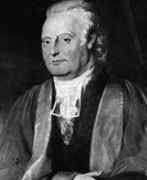Person: Waring, Edward

Edward Waring was an English mathematician who gave many results about decomposing numbers into sums of powers and sums of primes.
Mathematical Profile (Excerpt):
- Waring entered Magdalene College, Cambridge on 24 March 1753.
- On 24 April 1754 Waring was elected a fellow of Magdalene College.
- Waring's most famous work was Meditationes Algebraicae which he worked on during the next few years.
- When Waring was nominated for the Lucasian Chair of Mathematics at Cambridge in 1759, the work was distributed as Miscellanea Analytica to prove he was qualified for the post despite his youth.
- William Powell of St John's College Cambridge had his own ideas about who should fill the Lucasian Chair of Mathematics and attempted to prevent Waring being appointed.
- He put out a pamphlet entitled Observations which criticised Waring and doubted his mathematical abilities.
- Waring responded to this criticism on 25 January 1760 with the pamphlet A reply to the observations.
- John Wilson now wrote A letter to support Waring and this was sufficient to see him confirmed as Lucasian professor on 28 January 1760 at the age of 23.
- When Miscellanea Analytica was published as a complete work in 1762, Waring chose to call it a second edition.
- On 2 June 1763 Waring was elected a Fellow of the Royal Society.
- Waring responded quickly to this comment by writing a letter to Nevil Maskelyne, the Astronomer Royal.
- In the letter Waring pointed out that d'Alembert, Euler and Lagrange had all praised his 1762 work.
- The reason that so few had read the book was partly because the subject matter was difficult, partly because Waring was a poor communicator, and partly because he did not have a good algebraic notation.
- It would be reasonable to compare Waring with Ruffini who, about 150 years later, suffered the same fate with his work in algebra for much the same reasons.
- One would not expect the Lucasian professor of mathematics to take a medical degree but that is exactly what Waring did, graduating with his M.D. in 1767.
- One might ask how Waring could practise medicine and hold the Lucasian Chair at the same time.
- They lived for a while in Shrewsbury but the town was not to Mary's liking and the couple moved to Waring's estate at Plealey in Pontesbury.
- Waring's Miscellane analytica...
- In Meditationes Algebraicae Waring proves that all rational symmetric functions of the roots of an equation can be expressed as rational functions of the coefficients.
- This work makes Waring one of the earliest contributers to Galois theory.
- The rest of the book deals with number theory, a topic in which Waring made some interesting advances.
- Although Goldbach proposed his question in a letter to Euler long before Waring published Meditationes Algebraicae it is still worth noting that Waring's version was the first to be published.
- It is reasonable to assume that Waring had this type of result in mind when he stated 'Waring's theorem'.
- Waring also wrote on algebraic curves, classifying quartic curves into 12 main divisions with 84551 subdivisions.
- Several descriptions of Waring given by authors from his own period are not too flattering.
- This last statement may partly explain the strange fact that although Waring was elected a Fellow of the Royal Society in 1763 and had the great distinction of being awarded its Copley Medal in 1784, he resigned from the Society in 1795 claiming poverty.
Born 1736, Old Heath (near Shrewsbury), Shropshire, England. Died 15 August 1798, Pontesbury, Shropshire, England.
View full biography at MacTutor
Tags relevant for this person:
Ancient Arab, Origin England
Thank you to the contributors under CC BY-SA 4.0! 

- Github:
-

- non-Github:
- @J-J-O'Connor
- @E-F-Robertson
References
Adapted from other CC BY-SA 4.0 Sources:
- O’Connor, John J; Robertson, Edmund F: MacTutor History of Mathematics Archive
